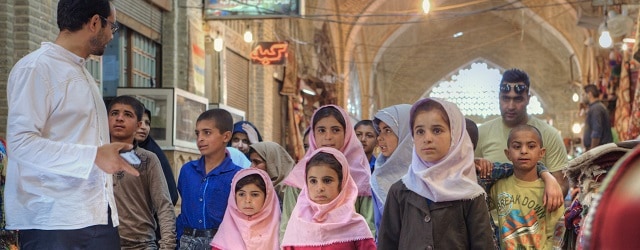Digitization is remaking Islamic finance, helping banks match the demands of younger consumers and even expand banking in war-torn Yemen.

As digital innovation assumes a larger role in the lives of Muslims across the world, Middle Eastern banks are hard at work introducing digital features into Islamic banking. The past year saw a number of firsts, including the first online payment system for payments and collections related to the Umrah, or pilgrimage to Mecca; the first sharia-compliant end-to-end digital personal finance service; and even an e-loan service for small enterprises in war-ravaged Yemen.
Lacking a comprehensive Islamic fintech ecosystem, there is much still to be done to bring the latest digital conveniences into line with Islamic banking strictures. Nonetheless, the four institutions that are Global Finance’s 2020 Most Innovative Banks in Islamic Finance have broken considerable new ground, spurred in part by the needs of the rising generation.
Gulf International Bank (GIB) digitized Umrah payments, including visa fees and service charges; its digital Umrah payment system allows 24/7 automated Umrah payments and collections in real time. The infrastructure is powered by GIB’s flagship global transaction banking product, eCollect, which enables Sejel, an IT company providing software for the eUmrah portal, to integrate its ecosystem through an application programming interface. The first bank to go live with this solution in the region, GIB has onboarded more than 600 Umrah operators and 7,000-plus external agents, from account opening to eBanking access. On the flipside, after Saudi Arabia canceled visas for Umrah visits in response to the novel coronavirus outbreak, GIB’s digitized Umrah payments are also making refunds easier.
Abu Dhabi Islamic Bank (ADIB), the market leader across Islamic syndicated finance bookrunner league tables, is also working the retail end with the launch of Express Finance, the first digital, sharia-compliant end-to-end personal finance service. Express Finance enables approved customers to receive funds in as little as 30 minutes through ADIB’s mobile app. It is available only to prequalified customers, whose salaries are paid directly into their ADIB account, meet a minimum monthly salary requirement, hold a healthy credit rating and work for an approved company.
In response to growing demand from younger customers for more digital banking, ADIB also launched Smartbanking, the first simple, personalized Islamic banking offering to meet the evolving financial and lifestyle needs of millennials and customers of the next generation.
“Our research shows that this segment’s expectations for banking services are shaped by their lifestyle and day-to-day mobile applications,” Philip King, global head of retail banking at ADIB, commented in a statement on the Smartbanking launch. Smartbanking is integrated with ADIB’s moneysmart online community: the United Arab Emirates’ first digital community for personal finance, where users can exchange information, financial experiences and advice.
In 2019, Qatar Islamic Bank (QIB) introduced its Digital Onboarding process, which allows prospective customers to start a relationship with the bank by opening a savings account that authorizes the bank to invest funds in the sharia-compliant mudaraba investment model; a Misk savings account, complete with opportunities to win weekly and monthly prizes and an annual grand prize; or a current account through the QIB Mobile App. Interested customers must download the mobile app, then use digital identification technology to scan the required documents—a Qatari ID, or a passport in the case of expatriates—take a selfie and provide other personal data.
To facilitate a seamless experience, QIB has also introduced a new Live Chat feature as part of the onboarding process. This allows customers to directly get in touch with a QIB customer service representative if they have any queries or need further onboarding assistance. Following quick real-time verifications, the account is set up. A bank representative contacts the customer within minutes to agree on a time and place to deliver a debit card and complete the process.
Microfinance in Yemen
Al-Amal Microfinance Bank (AMB), the first microfinance bank in the Middle East and North Africa region, was established in Yemen in 2009 to offer sustainable financial services to low-income households, particularly owners of micro and small enterprises. AMB’s sharia-compliant electronic loan service (e -loan) helps customers diversify their income sources, addressing the lack of cash liquidity in Yemen. The country’s banks have faced a liquidity crisis since war broke out in 2015, leading to the suspension of loans to small enterprises.
AMB is committed to providing comprehensive financial services to all Yemenis, says a spokesperson; and the e-loan service makes it easy for them to access a loan with their mobile phones. “The Islamic electronic finance service, with all electronic financing transactions taking place via mobile banking on the PYES app and not in cash, has helped overcome the lack of liquidity and enabled the bank to finance the owners of small and micro enterprises via electronic money,” the spokesperson says.
The new service achieves broader financial inclusion through three basic attributes, AMB says: improved quality, increased access and reduced cost of service. Request and renewal of Islamic finance is done through the bank’s PYES app. Users can make installment payments through their mobile phones by deducting from their electronic accounts.
The service also helps AMB target unbanked clients in rural areas, avoiding risky and high-cost field visits and creating wider financial inclusion. About 60% of Yeminis live in rural areas and lack financial services due to weak or nonexistent infrastructure. But mobile phone use is much higher than in urban centers, as people rely on them for information amid wartime power cuts.
Islamic Finance Innovators 2020 |
|
|---|---|
Company |
Innovation |
| Abu Dhabi Commercial Bank | Express Finance, Smartbanking and Moneysmart.ae |
| Al-Amal Microfinance Bank | Electronic Loan Service (E-loan) |
| Gulf International Bank | Digitizing Umrah Payments |
| Qatar Islamic Bank | Digital Onboarding |



